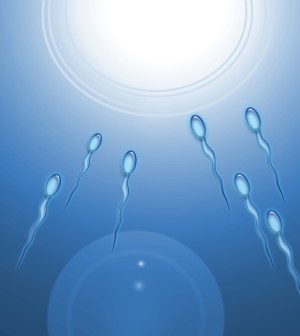- His Cancer Journey Shows Health Dangers Firefighters Face
- Baby Girl Born Deaf Gains Hearing After Gene Therapy
- Cyberattack Cripples Major U.S. Health Care Network
- Cancer Patients Often Face Medical Debt, Even With Insurance
- One in 8 U.S. Adults Have Now Used Blockbuster Meds Like Ozempic
- Pushing the Body in ‘Extreme’ Sports Won’t Shorten Life Span
- Utah Kids Got E. Coli From Playing Around Lawn Sprinklers
- Getting Help for Alcohol, Drug Abuse Tougher for Rural Americans
- Outdoor Workers Face Skin Cancer Danger
- The Pros & Cons of Robotic Knee Replacement Surgery
Stem Cell Transplants May Harm Recipient’s Sex Life


THURSDAY, Oct. 24Blood and bone marrow stem cell transplants may put a damper on the sex lives of cancer patients, a new study suggests.
This type of stem cell transplant is an increasingly effective form of treatment for patients with blood cancers such as leukemia, lymphoma and myeloma. Writing in the Oct. 24 issue of Blood, researchers say that while stem cell transplant was once tied to a high risk of death, survival rates have steadily risen and there’s now more focus on the patients’ quality of life, including their sexual well-being.
“It is not often that the transplant team and patient will have a conversation about how this procedure could impact their sex life, even after recovery,” study lead author F. Lennie Wong, of City of Hope in Duarte, Calif., said in a journal news release. “However, we hope these findings will help encourage patients and their doctors to openly discuss concerns related to sexual dysfunction and address them with specialists who can help.”
The new study included 152 men and 125 women averaging 48 years of age, who underwent stem cell transplants between 2001 and 2005, and were followed-up for three years.
The percentage of men who said they were sexually active fell from 61 percent before the procedure to 54 percent afterwards, but rose from 37 percent to 52 percent among women, according to the study.
Among men who received total body radiation, there was a nearly 18 percent decline in sexual function, a 32 percent decrease in sexual satisfaction, a 26 percent drop in both sexual behavior/experience and quality of orgasm, and a 17 percent decrease in sex drive/relationship. Radiation treatment did not appear to affect women in these areas, the study authors noted in the news release.
Men who developed stem cell transplant rejection — where the body’s immune system fights the new cells — had a 21 percent decrease in sexual thoughts/fantasy and a 24 percent decline in the quality of orgasm, the findings showed. Women who experienced transplant rejection had a 27 percent decline in both sexual satisfaction and sexual arousal.
Overall, women experienced significantly worse sexual effects than men, despite the fact that their sexual activity increased after their transplant, the investigators concluded.
The researchers believe that nearly half of people who undergo stem cell transplant are sexually inactive three years after their transplant. Patients may benefit from speaking with their doctors about their sexual health, the authors suggested.
More information
The American Cancer Society outlines the types of stem cell transplants used to treat cancer.
Source: HealthDay
Copyright © 2024 HealthDay. All rights reserved.









